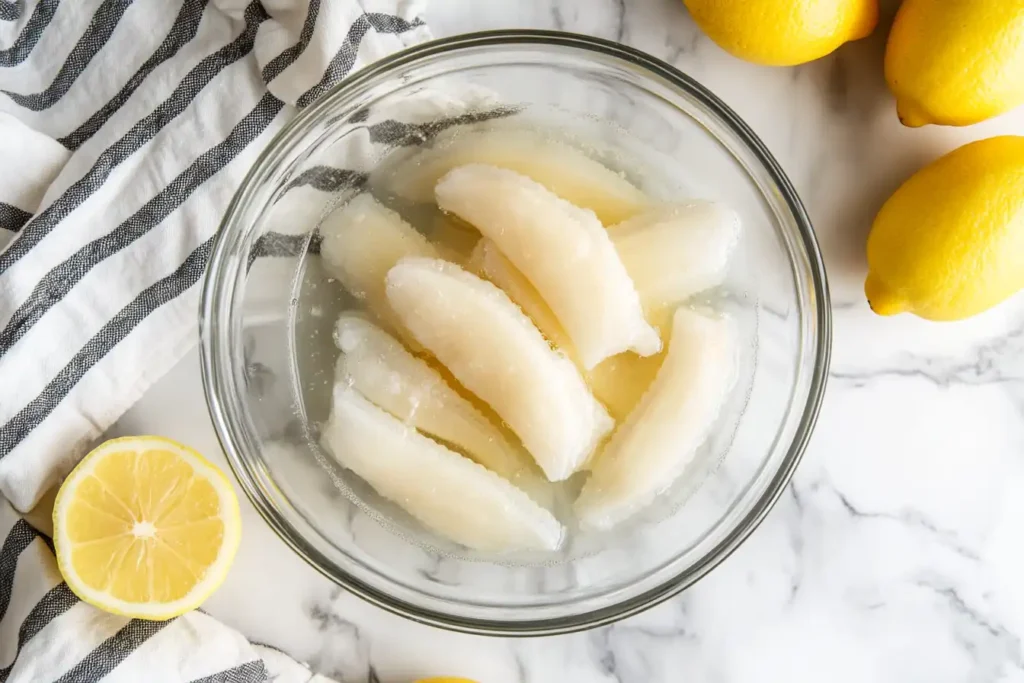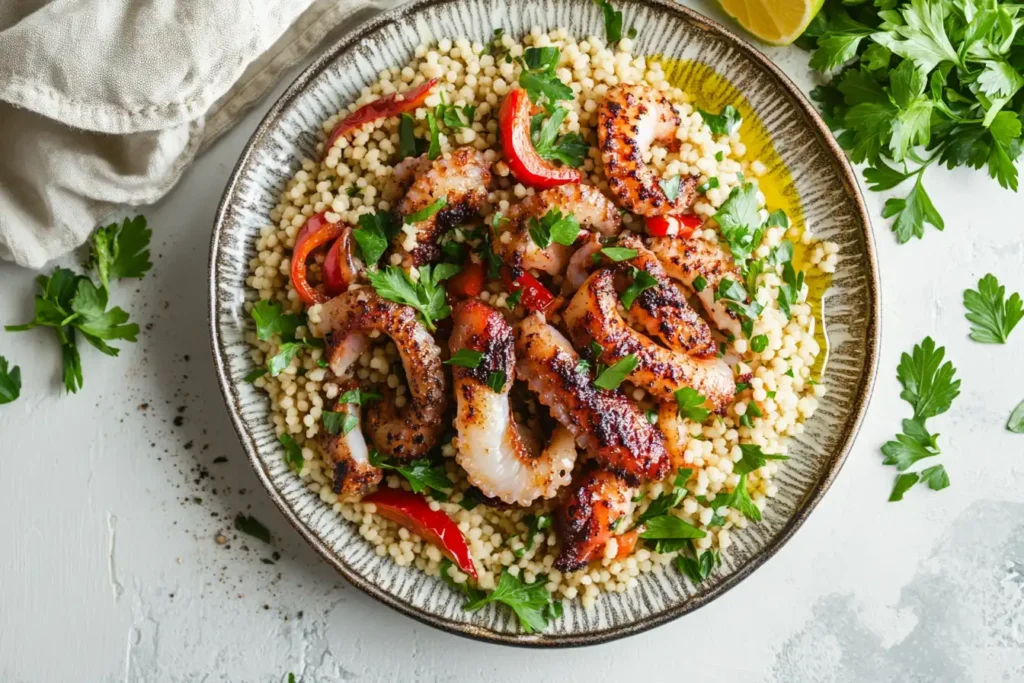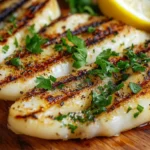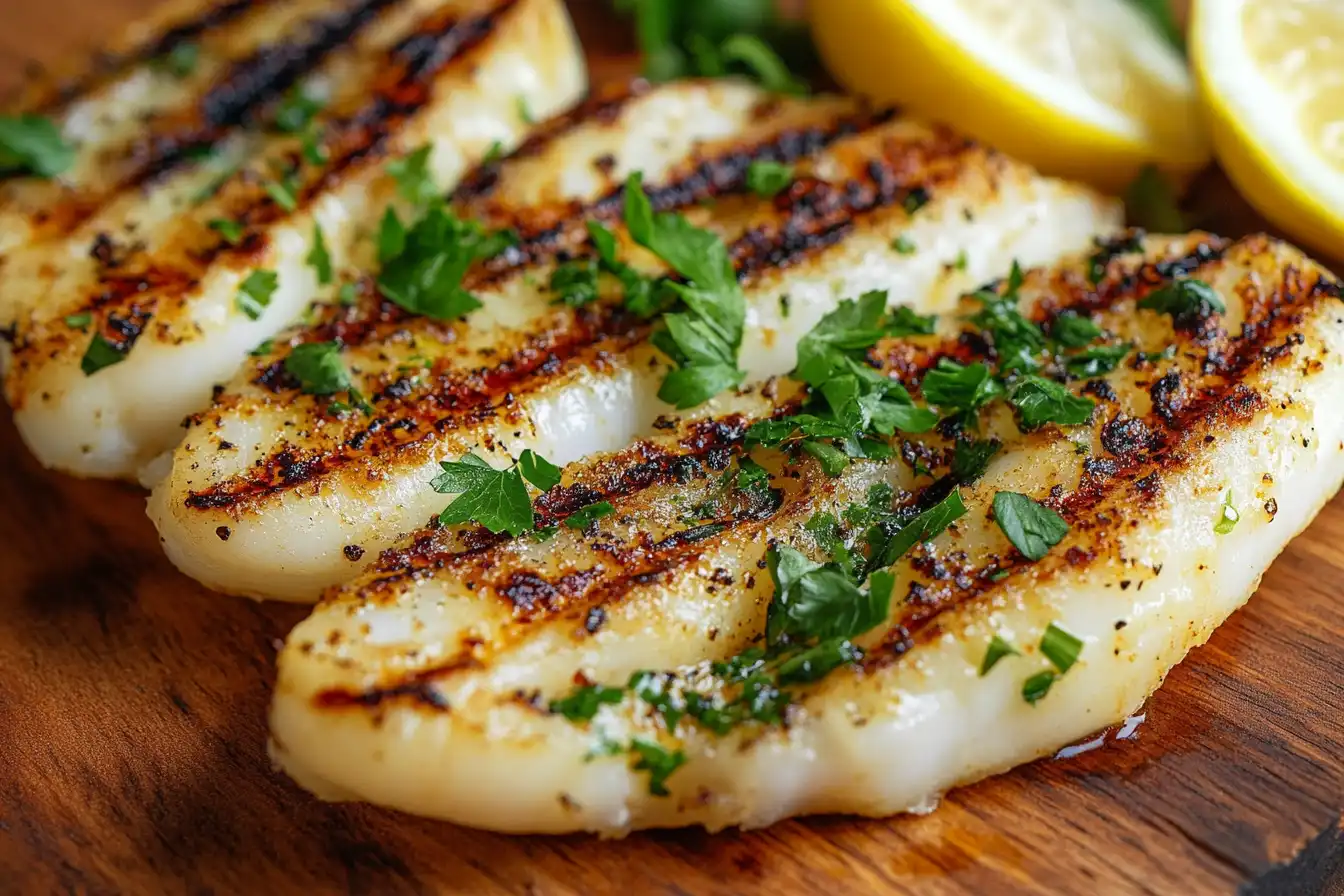How do you cook calamari steaks from Costco? Cooking calamari steaks can seem daunting, but it’s easier than you might think! Whether you’re a seasoned seafood enthusiast or a curious beginner, this guide will walk you through everything you need to know to prepare tender, flavorful calamari steaks from Costco. From understanding their origins to mastering preparation and cooking techniques, you’ll soon be serving up restaurant-quality dishes at home.
Introduction to Cooking Calamari Steaks
What Are Calamari Steaks?
Calamari steaks come from the body of a squid, sliced into broad, flat pieces. If you’re wondering “How do you cook calamari steaks from Costco,” you’ll be happy to know that these larger, meatier cuts are ideal for a variety of cooking methods. Their mild flavor and tender texture make them versatile for grilling, searing, or baking. With proper preparation, calamari steaks transform into a delectable seafood dish that’s perfect for any occasion.
Squid is naturally rich in protein and low in fat, making it a great choice for health-conscious eaters. But don’t let their simplicity fool you—when prepared correctly, these steaks can rival gourmet dishes at fancy restaurants.
Why Choose Costco’s Calamari Steaks?
Costco’s calamari steaks are a popular choice because they offer high-quality seafood at an affordable price. Known for sourcing premium products, Costco provides frozen calamari steaks that are convenient to store and cook at home. Plus, their consistency in size and quality ensures reliable results every time.
The frozen steaks are vacuum-sealed to maintain freshness, so you won’t have to worry about compromised taste or texture. Whether you’re experimenting with a new recipe or cooking for a crowd, Costco’s calamari steaks are an excellent starting point for creating an unforgettable meal.
Understanding Calamari Steaks
Source and Quality of Costco’s Calamari Steaks
Costco prides itself on providing high-quality calamari steaks sourced from reputable suppliers. If you’re wondering, How do you cook calamari steaks from Costco?, it starts with understanding the exceptional quality of the product. Typically, these steaks are made from large, sustainable squid varieties, ensuring they are fresh, flavorful, and safe for consumption. When you pick up a pack of calamari steaks at Costco, you’re getting a product that’s been carefully processed to retain its natural taste and tenderness.
The squid steaks are flash-frozen shortly after being caught, locking in nutrients and flavor. This process ensures that when you thaw and cook them, they’ll taste as close to fresh as possible. How do you cook calamari steaks from Costco? There are many ways to prepare them—grilled, pan-seared, or breaded and fried, depending on your preference. Cooking them quickly over high heat prevents them from becoming tough, preserving their delicate texture.
Moreover, Costco’s commitment to sustainability often means that their seafood is responsibly harvested, making it an ethical choice for environmentally conscious cooks. Whether you’re a seafood enthusiast or trying calamari steaks for the first time, knowing how to prepare them properly ensures a delicious, restaurant-quality dish at home.
Nutritional Benefits of Calamari
If you’re looking for a meal that’s both delicious and nutritious, calamari steaks are a fantastic option. They’re packed with protein, low in fat, and rich in essential nutrients like omega-3 fatty acids, vitamin B12, and selenium. These nutrients contribute to heart health, cognitive function, and overall well-being.
Additionally, calamari is a great alternative to higher-fat proteins, making it a suitable choice for those on a balanced diet. Whether grilled, seared, or baked, calamari steaks retain their nutritional value while delivering a satisfying taste.
Selecting the Best Calamari Steaks at Costco
When shopping for calamari steaks, look for packages that are well-sealed and free from frost or ice crystals, which can indicate freezer burn. Check the expiration date and ensure the steaks appear uniform in size, which helps with even cooking.
To get the best deal, consider buying in bulk at Costco, but always ensure you have adequate freezer space to store them properly. By choosing high-quality steaks, you’ll set yourself up for cooking success!
Preparing Calamari Steaks for Cooking
Thawing Frozen Calamari Steaks Safely
Before you begin cooking your Costco calamari steaks, proper thawing is crucial for both safety and quality. If you’ve been asking, How do you cook calamari steaks from Costco?, starting with the right thawing method is essential. The best approach is to thaw them gradually in the refrigerator. Place the frozen steaks on a plate or in a shallow dish, covering them loosely to prevent any drips. Allow 8-12 hours for them to defrost completely.
If you’re short on time, you can use the cold-water method. Submerge the sealed steaks in a bowl of cold water, changing the water every 30 minutes. Avoid using hot water, as it can lead to uneven thawing or partially cooking the squid.

Cleaning and Tenderizing Techniques
While Costco’s calamari steaks are usually pre-cleaned, it’s always a good idea to inspect them for any residual membrane or connective tissue. If needed, gently remove any remaining bits with a sharp knife. Pat the steaks dry with paper towels to remove excess moisture, which helps achieve a better sear or grill.
To tenderize, lightly score the surface of the steaks in a crisscross pattern. Use the back of a knife or a meat mallet to gently pound them, being careful not to tear the meat. This step helps prevent toughness and allows marinades to penetrate more effectively.
Marinating Options for Enhanced Flavor
Marinating is a game-changer for calamari steaks. A simple marinade of olive oil, lemon juice, garlic, and fresh herbs like parsley or oregano enhances their natural flavor. How do you cook calamari steaks from Costco? One of the best ways to start is with a flavorful marinade. If you prefer a spicier kick, add red pepper flakes or paprika. Let the steaks marinate for 20-30 minutes in the refrigerator—longer marinades can overpower the delicate squid taste.
For those who prefer a sweeter note, a honey-soy marinade with ginger is another great option. Regardless of your choice, avoid acidic marinades for extended periods, as they can break down the texture and make the calamari mushy.
Wondering, “How do you cook calamari steaks from Costco?“ Once thawed, cleaned, and marinated, your calamari steaks are ready to cook. Whether you’re grilling, searing, or baking, this preparation ensures they turn out tender, flavorful, and perfectly cooked. By taking these extra steps, you’ll elevate your calamari steaks from ordinary to extraordinary!
Cooking Methods for Calamari Steaks
Grilling Calamari Steaks
Grilling is one of the most popular ways to cook calamari steaks because it adds a smoky flavor and beautiful char marks. To grill calamari steaks, start by preheating your grill to medium-high heat and oiling the grates to prevent sticking.
Step-by-Step Grilling Instructions
- Remove the steaks from their marinade and shake off any excess liquid.
- Place them on the preheated grill. Cook for about 2-3 minutes per side until they’re opaque and slightly firm. Avoid overcooking, as squid can become rubbery.
- Once done, transfer the steaks to a plate and let them rest for a minute before serving.
Recommended Seasonings and Marinades
Enhance the grilled flavor by brushing the steaks with olive oil and a mix of minced garlic, lemon zest, and fresh parsley. For an added twist, a sprinkle of smoked paprika or crushed red pepper flakes works wonders.
Pan-Searing Calamari Steaks
Pan-searing is another excellent method for cooking calamari steaks, especially if you prefer a quick and simple approach. This technique creates a golden crust while locking in the juices.
Step-by-Step Pan-Searing Instructions
- Heat a tablespoon of olive oil or butter in a non-stick skillet over medium-high heat.
- Place the calamari steaks in the pan, ensuring they don’t overlap. Cook for 1-2 minutes per side.
- Check for doneness by looking for an opaque appearance and slight firmness.
Ideal Oil Types and Cooking Temperatures
For the best results, use oils with a high smoke point, such as avocado or grapeseed oil. Maintain a moderate heat level to avoid overcooking and ensure even searing.
Baking Calamari Steaks
Baking is a hands-off cooking method that’s perfect for achieving tender calamari steaks. Preheat your oven to 375°F (190°C) and prepare a baking dish.
Step-by-Step Baking Instructions
- Place the steaks in a greased baking dish and season them with salt, pepper, and your favorite herbs.
- Optionally, coat the steaks with breadcrumbs for a crispy texture.
- Bake for 12-15 minutes, flipping halfway through. Check for doneness with a fork—it should easily pierce the steak without resistance.
Suggested Coatings and Breading Techniques
For a crispy finish, dredge the steaks in a mixture of flour, egg wash, and panko breadcrumbs before baking. This technique adds crunch while keeping the calamari tender inside.
For additional tips and expert advice on achieving tender calamari, check out this detailed guide on cooking tender calamari. By experimenting with these cooking methods, you can find the one that suits your taste and preferences. Each approach brings out unique flavors and textures, ensuring that your Costco calamari steaks are always a hit!
Serving Suggestions for Calamari Steaks
Complementary Side Dishes
Pairing your calamari steaks with the right side dishes can elevate the entire meal. If you’re wondering, How do you cook calamari steaks from Costco?, the perfect side dishes can complement your cooking efforts. For a light and refreshing option, Serve the steaks with a crisp garden salad featuring arugula source. , cherry tomatoes, and a zesty lemon vinaigrette. Alternatively, steamed vegetables like asparagus, zucchini, or green beans provide a colorful and nutritious complement.
If you’re looking for something heartier, consider garlic-infused mashed potatoes or a side of fluffy rice pilaf. These starchy accompaniments balance the flavors and textures of the calamari. For a Mediterranean twist, pair the steaks with couscous and roasted red peppers.

Appropriate Sauces and Garnishes
Sauces can transform calamari steaks into a gourmet delight. A classic lemon-butter sauce, made with melted butter, fresh lemon juice, and a sprinkle of parsley, enhances the natural seafood flavor. If you prefer a creamy accompaniment, try a garlic aioli or a yogurt-based tzatziki.
For garnishes, keep it simple yet flavorful. Fresh parsley, dill, or cilantro adds a pop of color and taste. Lemon wedges on the side not only brighten the dish visually but also allow diners to adjust the flavor to their liking.
Non-Alcoholic Beverage Pairings
Complement your Costco calamari steaks with refreshing drinks that enhance the meal’s overall flavor. Sparkling water with a twist of lemon or lime offers a palate-cleansing effect. Alternatively, herbal teas like chamomile or mint provide subtle notes that pair well with the delicate taste of the calamari.
With these serving suggestions, you can turn your calamari steaks into a complete and satisfying meal. Whether you’re hosting a dinner party or enjoying a quiet night at home, these ideas ensure that your dish shines every time.
Common Mistakes to Avoid When Cooking Calamari Steaks
Overcooking and Its Effects
One of the most common pitfalls when cooking calamari steaks is overcooking. Squid has a delicate structure, and cooking it for too long can turn the tender steaks into a rubbery, chewy mess. To avoid this, always keep a close eye on the cooking time—whether grilling, pan-searing, or baking, calamari steaks typically only need 2-3 minutes per side.
Insufficient Seasoning
Another mistake is skimping on seasoning. While calamari has a naturally mild flavor, it needs the right combination of spices, herbs, or marinades to truly shine. Failing to season your steaks properly can result in a bland dish. How do you cook calamari steaks from Costco? Start by experimenting with flavors like garlic, lemon, parsley, and smoked paprika to create a more vibrant taste. Proper seasoning enhances the natural flavor and prevents your dish from falling flat.
Improper Thawing Techniques
Thawing your Costco calamari steaks incorrectly can compromise their texture and taste. Never thaw squid at room temperature or in hot water, as this can lead to uneven defrosting and a mushy consistency. How do you cook calamari steaks from Costco the right way? One crucial step is to use safe thawing methods, such as refrigeration or cold-water thawing, to maintain the steaks’ quality and texture.
Avoiding these mistakes ensures your calamari steaks turn out tender, flavorful, and cooked to perfection. With a little attention to detail, you can consistently achieve restaurant-quality results!
Frequently Asked Questions About Cooking Calamari Steaks from Costco
How Long Should I Cook Calamari Steaks to Avoid Toughness?
Cooking calamari steaks quickly is the key to keeping them tender. Typically, 2-3 minutes per side is enough when grilling, pan-searing, or baking. Overcooking causes the squid proteins to tighten, resulting in a chewy texture. Always watch closely and remove the steaks from heat as soon as they turn opaque.
Can I Cook Calamari Steaks from Frozen, or Should They Be Thawed First?
It’s best to thaw frozen Costco calamari steaks before cooking to ensure even cooking. While cooking from frozen is possible, it often leads to uneven textures. Use the refrigerator thawing method or the cold-water technique for safe and effective results.
What Are Some Recommended Marinades for Calamari Steaks?
Marinades like garlic-lemon, soy-ginger, or olive oil with herbs bring out the natural flavors of calamari steaks. Avoid marinating for more than 30 minutes if your marinade contains acids like lemon juice or vinegar, as prolonged exposure can break down the texture of the calamari.
How Can I Tell When Calamari Steaks Are Fully Cooked?
Cooked calamari turns opaque and slightly firm to the touch. A quick test is to gently press the steak with a fork—if it flakes slightly and feels tender, it’s done. Overcooking will make it rubbery, so timing is critical.
Are There Any Health Concerns Associated with Eating Calamari?
Calamari is generally safe to eat when cooked properly. It’s a rich source of protein, vitamins, and minerals. However, ensure it’s thoroughly cooked to reduce the risk of foodborne illnesses. Individuals with seafood allergies should avoid calamari.
What Are Some Alternative Cooking Methods for Calamari Steaks?
Besides grilling, pan-searing, or baking, you can try air frying or broiling. Air frying gives calamari a crispy exterior without excess oil, while broiling provides a quick, high-heat option. These methods are great for adding variety to your seafood repertoire.
Addressing these common questions—including “How do you cook calamari steaks from Costco”—will help you master the art of cooking Costco calamari steaks. With this knowledge, you’ll be well-prepared to tackle any culinary challenge that comes your way!
Print
Quick and Easy Calamari Steaks Recipe
- Total Time: 11 minutes
- Yield: 4 servings 1x
- Diet: Gluten Free
Description
Calamari steaks are tender and flavorful when quickly cooked in a skillet or on the grill. Seasoned with garlic, olive oil, and fresh herbs, they make a quick and delicious seafood dish perfect for any meal!
Ingredients
- 4 calamari steaks (thawed, if frozen)
- 2 tbsp olive oil or melted butter
- 2 cloves garlic, minced
- 1 lemon, sliced (for garnish)
- 2 tbsp fresh parsley, chopped (for garnish)
- Salt and pepper, to taste
- Optional: 1/2 tsp paprika or chili flakes for extra flavor
Instructions
- Prepare the Steaks:
- Pat the calamari steaks dry with paper towels.
- Season both sides with salt, pepper, and optional paprika or chili flakes.
- Heat the Skillet or Grill:
- Heat a large skillet or grill pan over medium-high heat.
- Add olive oil or butter and allow it to heat until shimmering.
- Cook the Calamari Steaks:
- Place the steaks in the skillet or on the grill.
- Cook for 2-3 minutes on each side until golden brown and slightly charred. Be careful not to overcook, as calamari can become rubbery.
- Add Garlic (Optional):
- In the last minute of cooking, add minced garlic to the skillet and sauté until fragrant.
- Serve:
- Transfer to a plate and garnish with fresh parsley and lemon slices.
- Serve immediately with a side of your choice, such as rice, salad, or roasted vegetables.
Notes
- Do not overcook! Calamari steaks only need 2-3 minutes per side.
- For a tender texture, make sure the steaks are fully thawed before cooking.
- Marinate with olive oil, garlic, and lemon juice for 15 minutes before cooking for extra flavor.
- Serve with garlic butter sauce, tartar sauce, or aioli.
- Pair with steamed vegetables, a fresh salad, or creamy mashed potatoes.
- Prep Time: 5 minutes
- Cook Time: 6 minutes
- Category: Main Course
- Method: Pan-seared or Grilled
- Cuisine: Mediterranean-inspired
Nutrition
- Serving Size: 1 calamari steak
- Calories: 180
- Sugar: 0g
- Sodium: 350mg
- Fat: 8g
- Saturated Fat: 2g
- Unsaturated Fat: 6g
- Trans Fat: 0g
- Carbohydrates: 2g
- Fiber: 0g
- Protein: 25g
- Cholesterol: 140mg
Keywords: Calamari steaks, Costco calamari, grilled seafood, low-carb seafood, quick seafood recipe, high-protein dinner, Mediterranean-style, easy seafood dish.

